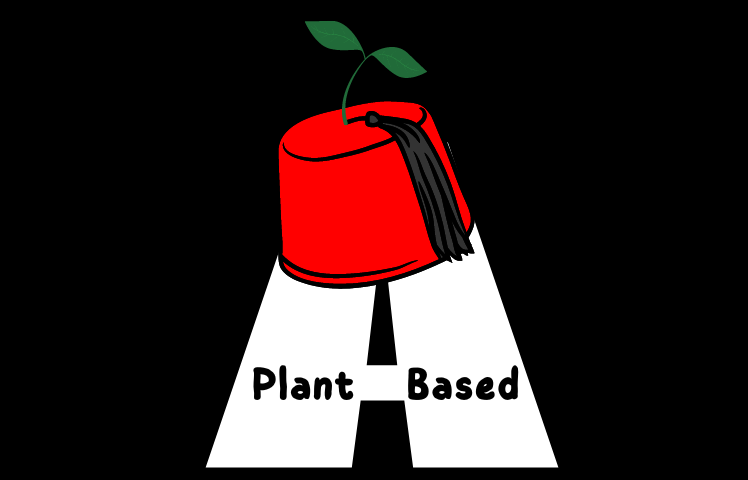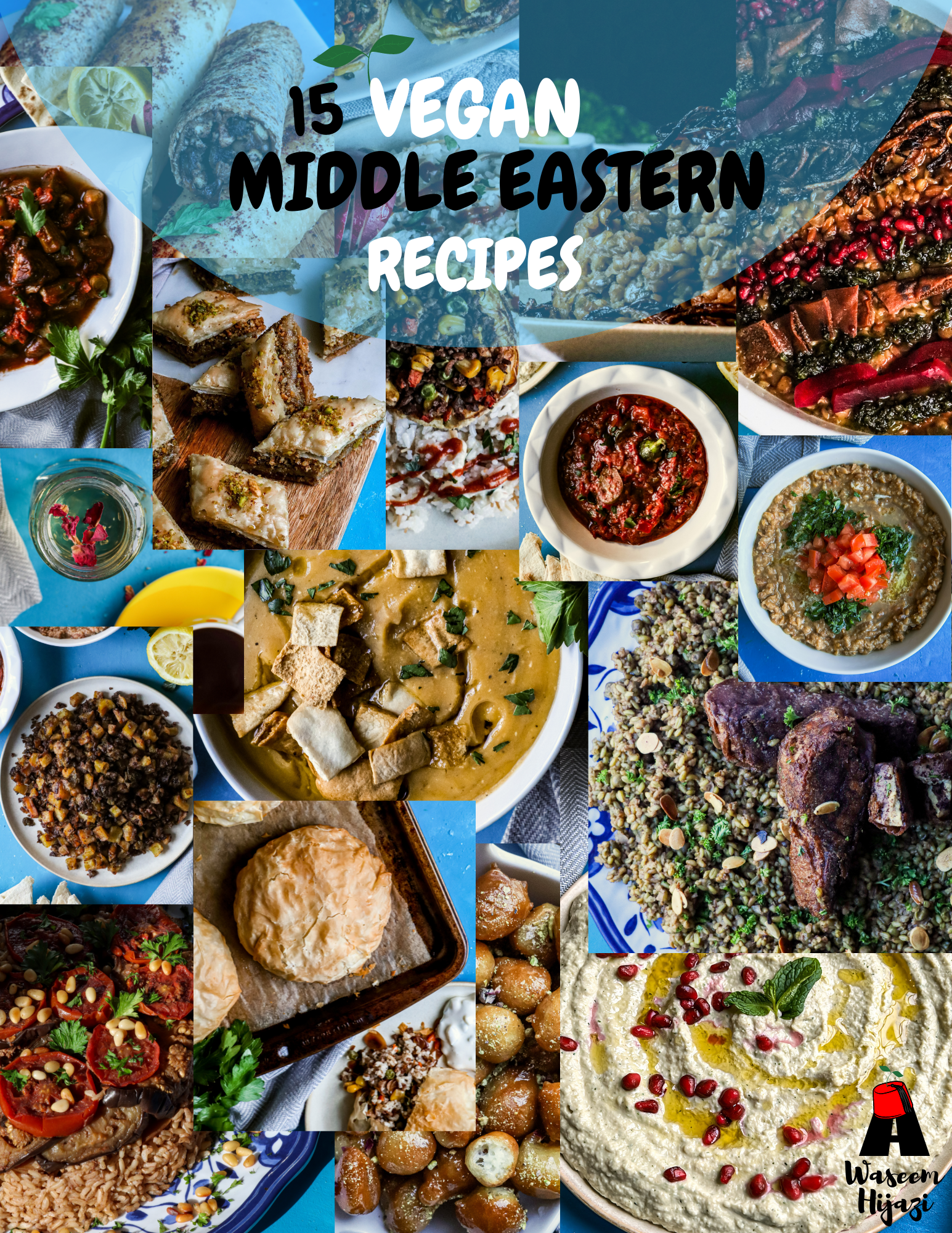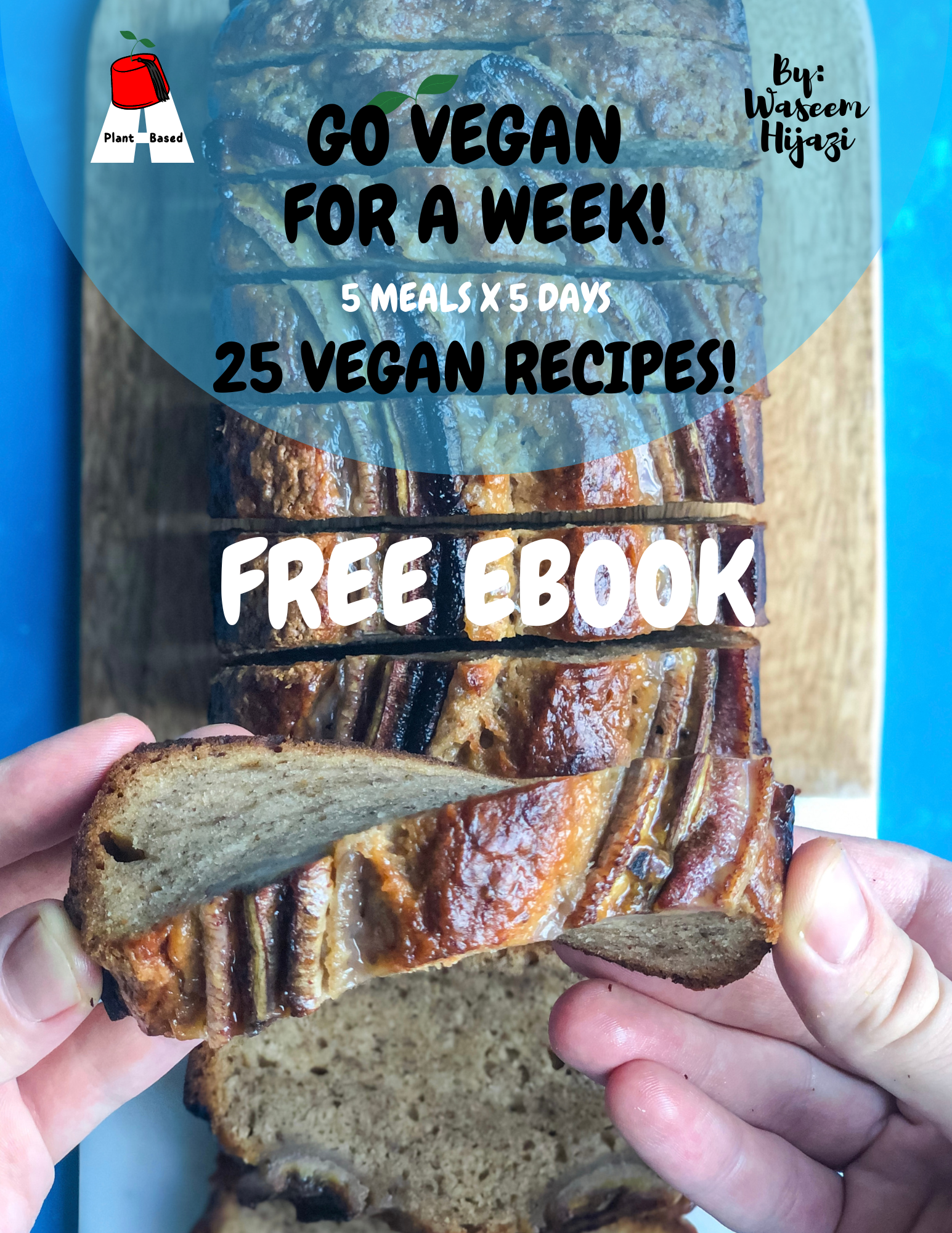Salam 👋🏼 I’m Waseem, and I’m pumped you’re here!
I believe the Arab cuisine is very vegan-friendly, and loaded with wholesome plant-based options.
Including many of the beloved globally-known Arabic foods – ever heard of Hummus? : )

I’m here to introduce you to the naturally-vegan Arabic recipes (like the authentic Falafel), and show you how easy it is to make traditional meat-based dishes with a plant-based twist – without compromising on taste or texture.
A Little About Me
As a Jordanian-born Palestinian (and part Syrian), I’ve had my fair share of Arabic foods. From the sweet & tangy, to the zesty herby, and bold earthy flavours…I’ve had it all!
I grew up around a family of food-lovers. I’m talking knowing what spices are in (or missing from) a specific dish; sometimes just by the smell of it. Eating time with them was not only special for their company, but also because that meant food was going to be that much more enjoyable. They’re real enthusiasts.
While my time in the kitchen (as a child) was mostly to eat, I spent a good amount of time helping out to prepare the meal and learning how it’s made. Ultimately, that led me to the door of opportunities (fridge door, at first :P). To start cooking my own food, exploring a world of flavours out there, and enjoying the different cuisines with my favourite dishes from each.
Living in Canada (far from family and home), it’s important to me to stay connected, and not lose out on my favourite childhood foods. Often times my friends and I would get together for a potluck, or we’d have a neighbourhood summer bbq to welcome new-comers. I always make sure to use those opportunities to introduce my culture to new friends and neighbours through my food.
And I aim to continue on doing so with my recipes at PBA.

My Struggle To Keep Up
During my college years in business school, studying finance and juggling a full-time job at a famous fast-food chain, it was easy to skip on the home-cooked meals. I was always busy with tons of work to do, and not enough time to cook. If I wasn’t on campus, I was at work. Besides, the employee discount was very appealing; and the food was right there…
I’m not gonna lie, it was good too. Fresh hot and greasy junk food made by me in a giant restaurant kitchen. That’s the dream.
Until one day, I finally realized the side effects. Not only was I full of acne (yes I’ve had a history of it, but it has worsened during my years of daily junk food), I would also feel super tired right after eating. I started feeling sick on the inside. Developing gut issues – without even knowing it – and that led to more complications down the years.
Eventually I decided to change things up. I began making some of my own meals ahead of time (taking them to school and work). By the time I left my job, I managed to have a good balance on my food choices – for the most part…
We all struggle from time to time to keep up with our to-do lists. I’m here to make it a little easier for you to happily check ‘eating’ off your list!

The Beginning
In early 2020, I decided to launch demeals* to share the Delicious & Easy Meals that I took to work for years. I was constantly asked by coworkers about the recipe, so they could bring their own instead of purchasing lunch. While it didn’t begin with vegan recipes, it was always hearty wholesome food that I would usually prep on the weekend in containers to store in the office fridge.
* demeals is the initial brand name, prior to rebranding in 2023 to the Plant Based Arab *
One day as I was reheating my meal in the microwave (while I returned to my desk for utensils and back to the kitchen), I heard someone whisper to a friend “What’s that nice smell? I can taste the spices from the other side of the floor!”. Then I hear the friend (my teammate) say [as I enter] “I bet that’s Waseem’s. Let’s ask him…Oh, told you!”.
We chatted a bit about what’s making all that aroma, and they were surprised when I revealed what was inside the microwave. It was a simple Arabic rice dish called Ruz w Bazilla (which translates to: Rice & Peas). But it’s packed with flavour. As they’re heating up their own food, and I’m adding the final touches to mine, they ask “What’s that sauce you got over there?”. I respond “It’s yoghurt with garlic, mint, salt & pepper, and a bit of sriracha. Try it!”. After insisting, they agreed to give it a taste. “Okay, wow!!”. Then I asked them to drizzle some over the rice and try again. “Never-mind. Now it’s WOW!!”.
I remember this story so vividly because that’s when it hit me!
Not many people here know of (or have tried) Arabic food. I need to share how Delicious & Easy our cuisine can be!

30 Day Challenges
During this time, I wanted to challenge myself into creating a healthier lifestyle for myself. I kicked off the year with – what some may call – “a new year’s resolution” to take up a monthly challenge that was centred around improving my overall health and well-being for the entire year.
I wrote down the goal of completing 10 of those challenges throughout the year (giving myself a break of a few days between each). The start of demeals’ first channel (on Instagram) was to document my 30-Day Challenges. It was a way to hold myself accountable.
Whether or not I complete them all, it didn’t matter. The idea was to do a recap at the end of each challenge to summarize what went well, and how to improve on it next time. With the addition to learn how I can implement some of these new habits for the long-term.

If you’d like to learn more about my 2020 Monthly Challenges, check out this guide (or click on the photo).
My second challenge was to try a Vegan Diet for 30 days. It was a spontaneous pick – I was scrolling down my Instagram feed, only to find the Best of Vegan page sharing a scrumptious-looking bowl. After browsing through, and discovering a whole other world of food, I was immediately drawn into wanting to give the vegan thing a try!
After successfully finishing a whole month of plant-based eating, and feeling more nourished than ever, I found myself making more meatless meals than the usual meat-based dishes. While I still consumed dairy and eggs for months after that, it was minimized to the point where I wondered if I really needed them.
I happened to be reading a book about the gut health (called Fiber Fueled *affiliate*) at the time, and the key messaging was to diversify our plants – meaning to eat different variety/types of plants. The book advocated for a diet that consisted of at least 90% whole-food plant-based ingredients. I was so intrigued by the idea that I wanted to try that as one of my challenges.
To my surprise, I discovered that it’s even easier than I ever imagined to consume so much plants. 30 different plants per week was the minimum recommendation in the book. By the end of my 30-day challenge, I was exceeding 50 plants a week!

If you’re interested in trying out a one-week vegan challenge, or if you’d like to add more plant-based meals to the table, grab a FREE copy of our Go Vegan For A Week eBook. You’ll find a collection of over 25 easy vegan recipes to help keep you nourished on plants for a week! Including breakfast, lunch, dinner, and desserts.
Suffice it to say that I was already shifting towards making the switch to a mostly plant-based diet. There was only one question: can I still enjoy my cultural childhood foods that I grew up eating, while maintaining a vegan diet?
Can Arabs Be Vegan?
You bet! But first, what is the meaning of vegan in Arabic?
The word ‘vegan’ translates to ‘نباتي’ ( pronounced: Nabati ) when you complete a quick Google search. Which is somewhat incorrect. Just click the arrows to switch the translation to from Arabic to English, and you’ll see the English word is now ‘vegetarian‘. Without going into too much details (about food appropriation), a more accurate term would be ‘خضري’ ( pronounced: Kh-o-da-ri ). The main difference is that this word (خضري), describes the exclusion of all animal products and animal byproducts from one’s lifestyle; while the (نباتي) translation means products like eggs and dairy are accepted – similar to the vegetarian diet.
Now back to our question. Although it took me a minute to think about it as I asked myself, the fact is, the Arab cuisine is loaded with plant-based options, and vegan-friendly Middle Eastern recipes. There is a variety of naturally-vegan Arabic recipes that I grew up enjoying as part of my regular diet. Including a collection of Arab dips and spreads – like: Baba Ghanoush, Muhammara, and Mutabbal, to name a few. Plus a selection of popular home-staple dishes (like: Mujaddara, Horak Osbao, and Lentil Soup).
Check out my interview at Best of Vegan with Val & Mani (from Plant Based Passport) to read more about being a vegan Arab, and my journey towards a plant-based diet.
There’s no doubt that the Arab cuisine also features many traditional meat-based dishes. However, that doesn’t mean that they can’t be enjoyed with a plant-based twist. Being open to the idea of exploring different cooking methods – and using uncommon ingredients to replace the original way a recipe is made – has allowed me to enjoy lots of my favourite childhood recipes. I’m still no-where near perfecting to veganize all the Arabic foods, but I’m on a mission to do so!
After over 2 years of following a plant-based diet, experimenting with unique ingredients, and testing which substitutes make the best replacement, I’ve been able to work on a series of vegan Arabic recipes that are no different than the real thing! Made with simple accessible and affordable ingredients, that are available to most people around the world.
Coming from a household where most of the meat-based dishes were cooked and served on the side, I can safely say that the vegan Arabic recipes you get here at PBA are just as authentic as you’ll ever find.

You can find a selection of traditional Arabic recipes (half of which are naturally vegan) in this Vegan Middle Eastern eBook. Including a variety of meat-based dishes, turned plant-based!
What To Expect Here
Having the privilege to live in a western country, with Arabic roots and the upbringing of Arab parents (who’s family come from various parts of the Middle East), I’m honoured to bring you the vegan Arab cuisine:
- Naturally-vegan Arabic recipes.
- Perfectly veganized classic Arabic dishes.
- Modern simplified takes on traditional Arabic foods.
Do you have a suggestion for a recipe you’d like to see here at PBA? I’d love to give it a try! Fill out this form to let me know, and I’ll do my best to create it (I’ll credit you/inform you once posted).
Popular Food To Make
Try traditional Arabic food made with a plant-based twist. Like this famous Palestinian national dish called Makloubeh (or Maqluba). It’s a layered rice dish that’s flipped upside-down once cooked for a fancy feast!
Learn how to recreate the authentic Arabic recipes in your own kitchen. You’ll find fun & educational videos to guide you with techniques that’ll help you enjoy the cooking process. Like this video on how-to roll cabbage leaves (Malfouf).
Satisfy your sweet cravings with some of our quick & easy no-bake treats. Including these popular protein-packed and gluten-free Banana Dates Cookies.
Find out how we veganize the cultural meat-based dishes with simple homemade ingredients to replace the meat. Like these incredibly undifferentiated Chicken Drumsticks, made vegan! We use them to make lots of traditional Arabic dinner recipes, like the Freekeh from our eBook.
Brand Collaborations
One of my favourite things about running my food blog is the challenges I receive to create something unique. It ignites a level of inspiration and creativity that allows me to see beyond the classic uses of basic ingredients. Instead, I enjoy discovering new fun and modern ways to make my childhood favourites.
We’ve collaborated with our wonderful partners on various projects to showcase the versatility of their products. Using them in unconventional ways to recreate recipes I grew up on, made with a plant-based spin. Check out some of our work:
If you’re a brand/company, and would like to collaborate on a project or campaign, please fill out this form to provide us with the information related to the nature of the work you’re looking for. Alternatively, feel free to reach out directly via Email to discuss your interest in partnering up.
As Featured On
Let’s Connect!
Whether you have a question about a recipe, my journey to a plant-based diet, how to make a specific Arabic recipe vegan, or you just want to pop by to say hi – I’d love to hear from you!
Please fill out this form, email or message us directly on Instagram.
Thank you for stopping by! 🙂
Happy Eating!
Waseem






